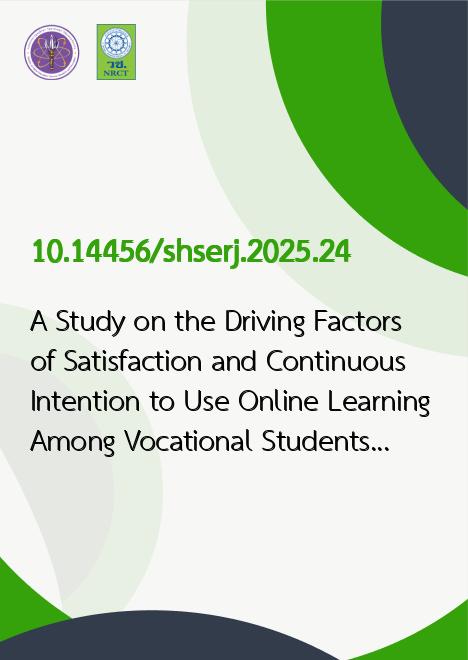
|
A Study on the Driving Factors of Satisfaction and Continuous Intention to Use Online Learning Among Vocational Students in China |
|---|---|
| รหัสดีโอไอ | |
| Creator | Xin Zhao |
| Title | A Study on the Driving Factors of Satisfaction and Continuous Intention to Use Online Learning Among Vocational Students in China |
| Publisher | Assumption University Press |
| Publication Year | 2568 |
| Journal Title | The Scholar: Human Sciences |
| Journal Vol. | 17 |
| Journal No. | 1 |
| Page no. | 253-261 |
| Keyword | Techincal Readiness, Self-Efficacy, Experience, Learning Satisfaction, Continuous Intention |
| URL Website | http://www.assumptionjournal.au.edu/index.php/Scholar/article/view/7801 |
| Website title | The Scholar: Human Sciences |
| ISSN | 2586-9388 |
| Abstract | Purpose: This study aims to explore the factors influencing the online learning satisfaction and continuous intention of the students majoring in folk music and dance at Rongjiang Secondary Vocational School, China. The research framework included seven variables: teachers technical readiness students technical readiness, self-efficacy, autonomy, quality of learning experience, learning satisfaction, and continuous intention. Research design, data, and methodology: The questionnaire was used to collect 500 sample data from the target population in this study. Purposive, quota, and convenience sampling were adopted. Before distributing the questionnaire, item-objective congruence (IOC) and a pilot test of Cronbach s Alpha were adopted to test the content's validity and reliability. The data were analyzed by confirmatory factor analysis and structural equation models to verify its fit and determine the causal relationship between variables. Result: The results show that the six hypotheses are supported. Teachers technological skills, students technical skills, students self-efficacy, students autonomy, and quality of learning experience significantly impact learning satisfaction. Learning satisfaction has a significant impact on continuous intention. Conclusions: To guarantee a high rate of learner engagement and satisfaction with e-learning, policymakers, practitioners, and educators should consider crucial variables such as offering efficient communication, innovative online courses, and training for existing and new users. |
